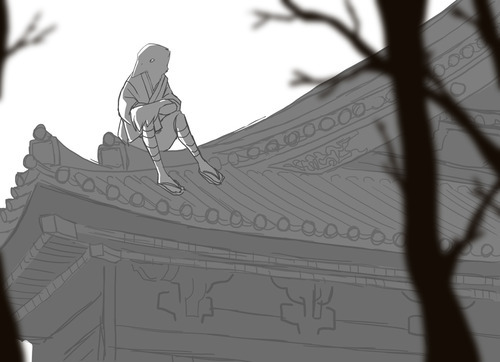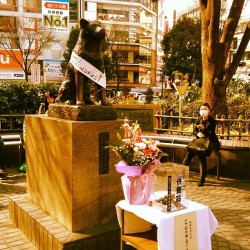Karasu (烏) - Part 05
Draw a temple roof, they said. It would be fun, they said.
Previous: Part 4
—————————

Karasu, Part 05
Sagiri didn’t need to ask her student if he had cut ties with the human — his behavior made the choice very clear. His performance in nearly all of his duties excelled. No longer distracted by long outings and daydreams, Shichi carried out his tasks with systematic precision. He devoted himself entirely to his work, filling every waking hour with study and labor. Even after his month of compulsory silence had ended, he continued to avoid interactions that weren’t deemed necessary. His mentor could have sworn that his eyes, which once drew over his surroundings with boundless curiosity, had gone unnaturally still.
The hollow sound of an axe blade on a dry stump echoed over the edge of the mountain. Winter was edging its way into the forest, leaving a bite in the air between barren trees. Though the tengu’s breath rose in clear puffs, the first frost had not yet come, and so his firewood duties continued. Two halves of a thick tree limb split with one swing, sending the pieces clattering down to the ground. Shichi knelt to pick them up, placing the wood at the top of a growing stack at his side. The soreness weeding through his body was only noticeable when he was at rest, and so he immediately positioned another piece on the stump. As long as he continued to work, he could ignore the dull pain. Only the approach of his master could bring him to set the axe down for a bow.
“Shichi, that’s enough for today,” she said, returning the gesture.
“I still need to bring these into storage,” he replied, glancing at the tall pile of firewood.
“You mustn’t miss dinner again. It’s becoming colder, and we don’t need a weak healer on our hands.”
Recently, Sagiri had become pleased enough with his skills that she had allowed her student to tend to the other monks independently. His abilities still needed refinement, but he had become competent, to say the least. The older tengu knew that she should feel pleased with his progress, but the emptiness in his voice somehow sobered her pride.
Shichi nodded in understanding, unfastening the bindings from his sleeves as he followed her back towards the main hall. Wide gingko trees lined the path — proud and golden only a month before, but now essentially bare. His eyes remained down as they walked, not noticing as the last of the autumn leaves floated gently to the cold earth.
Tengu often found comfort in high places, and Shichi was no exception to this trait. The roof of the temple provided an ideal site to find solace when the ground became overwhelming. It was also from this height that Shichi could catch a glimpse of the village at the bottom of the mountain. He knew that it wasn’t healthy for him to pine over the distant houses and neat curved roads, but it somehow brought him comfort to know that it was still there. This comfort, however, was disrupted by a pillar of black smoke. It rose from the edge of the village, illuminated by the setting sun.
With a nervous flutter in his stomach, he climbed back down the side of the temple. He found that he wasn’t the only one staring down the mountainside — Sanae had stopped to gaze in the same direction.
“That smoke,” he started, his voice shaken. “What could it be?”
“I suppose they’re burning bodies,” she replied, shaking her head. “I heard that a sickness swept through the village.”
It took all of Shichi’s willpower to keep his reaction steady. He could feel his chest wrench in fear.
“A… a sickness? What sort of sickness?”
“I’m not sure,” Sanae said. “But some of their elderly and children have already died. It’s terrible — I wish we could help them.”
It was only when she glanced sideways that she noticed that Shichi was no longer standing next to her.
In the workroom where he and Sagiri often prepared herbs, Shichi was digging hurriedly through drawers. He pulled out sachets of dried roots and powders, his heart thumping as he shoved them into a modest travelling bag. Making sure that he hadn’t been noticed, he slipped from the temple grounds into the winding forest. As he rushed over layers of dead leaves and cold stone, he could only imagine the worst. The thought of Kana, who was always so strong and inquisitive, now weakened with disease — it made his breath short and his hands prickle. He couldn’t allow it to happen. No matter what decision he’d made or what rules had been laid before him — he simply couldn’t.
By the time Shichi reached the outskirts of the village, darkness had fallen over the land. He had never dared to come so close to a human settlement before. Where he normally would have felt cautious and fascinated, he was now only foul with worry. Luckily, his movements were sheathed by the night, and he was able to slip behind each house unnoticed. The only signs of life were the occasional distraught voices from the road, as well as the scent of disease and ash in the air. As he passed house after house, the knot inside of him began to tighten. He had no idea which home was hers.
Then, just as his frustration began to overwhelm him, he spotted it — a plum tree. It was solid and crooked, growing along the outer walls of a large home. It curved lazily over the top of the wall, as if longing desperately to be inside. It looked perfect for climbing.
He pulled himself up the trunk, positioning low on the hanging bough to keep out of sight. It seemed the residents of the home were still awake — yellow light glowed from behind paper doors and there were faint shifts of shadowy movement behind them. Shichi realized that there was another obstacle in his poorly thought-out plan. He couldn’t simply stroll up to the front door, nor could he sneak inside the home without the chance of being killed.
So, he waited. Shichi had a long, intimate history with waiting. Over five hours of each day was spent meditating. He had waited for ice to melt, for seeds to sprout, and now, he would wait for Kana. It was only when the lights in the house went out that he thought to reconsider his plan. He had just started to humor risking a horrible death when the sound of a sliding door caught his attention. His head lifted, just barely, to glance down into the yard past the wall.
A woman emerged, head low with a shawl wrapped around her shoulders. His grasp on the tree bark tightened as he saw her face — it was her. It was Kana.
A small piece of his anxiety faded at the sight of her. She was alive. Not only that, but she was outside and fetching water — a hint that she might not be ill at all. His instincts told him that he should be happy with this knowledge and simply return home. Shichi couldn’t, however, tear his eyes from her. He felt guilty doing so, as if he didn’t have to right after being so cold — after hurting her.
Still, he couldn’t be entirely sure that she was indeed healthy. Now there was the simple matter of getting her attention. At first he attempted faint whistle, fearing that anything louder might attract more than just Kana. Despite her being directly below him, the sloshing water drowned out his meager call. Giving up on sound, he instead resorted to a visual distraction. With a wince, he plucked a long, black feather from his arm. It floated down gently, arcing with the breeze before landing directly into her freshly filled bucket.
Naturally, she glanced up. As she caught sight of him her expression matched the one she’d made when they first met — wide-eyed in disbelief. Without a word, he gestured with a nod that she follow, then slipped back down the tree.
Shichi waited along the side of the wall, unsure if she would actually come. He wondered if she was still angry with him. Kana had the right to reject his presence, just as he had done to her. Yet, despite her wish that he would have simply left her in that stream, he couldn’t bring himself to share the sentiment. Even though there was an emptiness where she once filled his life, he wouldn’t have traded those moments with her for a thing in the world.
From the end of the long, dark road, he could see the outline of her form. As she came closer, the faint moonlight highlighted the sheen in her hair and the hesitancy in her eyes. He could hear her say his name, though it was soft enough that he might have been mistaken. Ignoring the urge to rush up to her, he simply stood patiently as she approached.
“Why are you here?” she finally asked, her eyes cast downwards.
“I heard there was a sickness in the village and—”
“And what do you care? Aren’t we dangerous?”
At first, Shichi didn’t know how to respond. Though her words cut him, he knew that he had earned them. He took in a breath, then looked up.
“Please,” he said. “Just let me check you.”
“I’m fine.”
“Kana, please,” he repeated, unable to hide the distress in his tone.
“Just let me be,” she said, closing her eyes in frustration.
“Kana, I…,” he started, shifting just a bit closer. “I think about you every day. I always wonder if you’re all right… if you’re happy. The thought of you being ill, of you dying… I couldn’t bear it. I’m so sorry that I hurt you. You don’t have to forgive me. I just want to make sure you’re safe.”
She didn’t respond, only watching him with an unreadable expression.
“Please let me check you,” he repeated, now pleading.
After a moment, she tore her eyes away, giving a slight nod. Exhaling, he stepped closer and took her by the wrist. He checked her pulse, then lifted his hands to touch the spot where her jaw met her throat. His fingers pressed gently against her skin, feeling for any swelling. She avoided eye contact the entire time, but didn’t pull away.
“Your tongue,” he requested, to which she tentatively complied by opening her mouth.
Holding her chin steady, he took a moment to examine her before finally resting his hand on her forehead.
“How is your appetite?” he asked.
“It’s fine.”
“And your energy?”
“Fine.”
His hands left her and he took in a breath, closing his eyes in relief.
“You’re all right.”
“I told you I was,” she murmured. Not letting her cold demeanor get to him, he removed a package wrapped in paper from his bag.
“This is ogi root. Prepare it in a tea — it will strengthen your immunity,” he explained, placing it in her hands before she could protest. “And please share it with whoever you can. There’s plenty here.”
She stared down at the parcel in her hands for a while before mumbling a reply.
“So… I suppose you’ll be leaving then.”
Shichi couldn’t respond. He knew that he should say his goodbyes, perhaps with another apology, and return to the temple. He knew that every second he stood next to her was self-indulgent. After doing everything in his power to honor his mentor, he was once again betraying her. He was putting the entire temple in danger because he couldn’t stand to leave her on that street.
Giving in to his selfishness, he allowed himself to ask one more thing.
“Kana. When you… when you kissed me. Why did you do that?”
“I did it because I loved you,” she answered. There was no doubt in her voice.
“You did?” Shichi asked carefully.
“I still do.”
The knot in his chest twisted. It was a happy, wretched feeling. To know that Kana, of all people in the world, would say such a thing — it was elating. The trees on the street were bare, but to him they might as well have been bursting with color. The cold air felt suddenly warm and he became terribly aware of his own breath and pulse. Yet how could he just stand there and accept such words when he had been so unfair to her? With barely a word of explanation he had cast her out of his life, and even now she still loved him.
Being with Kana was dangerous — not only for the temple, but for her as well. What would happen to her if she were discovered? How would she be treated? If he chose to be with her, he would be abandoning his last hope of being a devoted student and would instead be giving in entirely to selfishness. If she chose him, she would lose any chance of having a normal life.
“Kana, you’re human. I’m a ‘monster.’ Are you certain—”
“I’m know what we are,” she replied, her eyes steady. “And I know what I want. But… what do you want?”
What did he want? The same question had been haunting him for a long time. When he centered his thoughts and truly listened to himself, he knew that he longed for her. He wanted to listen to her talk, to watch the trees change color together… he wanted to be near her — near enough to know the heat from her skin and the scent of her hair.
Wants, however, were not part of monastic life. His duty was to the temple — to serving, learning, and lowering himself before the world. The most important thing he could do was to help others, and giving in to personal desire was a distraction from that ideal.
Yet, somehow, he couldn’t bring himself to forget what he’d learned — the lessons on kindness, compassion, and love, and how important it was for these things to be nurtured. Love, such a precious commodity in a hate-filled world, was slipping through his fingers.
“I want to be with you,” he admitted. “But we’re not the same. We couldn’t ever… be together. We couldn’t have a family. Are you sure you could live like that?”
“I already have a family,” she said with a weary gaze towards her home.
“I don’t mean your mother and—”
“Neither do I.”
Shichi went still, not sure how to take her answer. Several different explanations went through his head, but only one made sense — one that he didn’t want to believe.
“What… do you mean?”
Just as her mouth opened, the sound of footsteps from the next street filled the air. There were muffled voices approaching the corner. Kana glanced towards the sound, then back at Shichi.
“It’s not safe here,” she said, clutching the package with both hands.
“I’ll go,” he said, taking a step backwards. “But…”
“I’ll come to see you next week. Will you be there?”
“I will.”
Before he could turn, she closed the gap between them, throwing her arms around him for a strong embrace. This time, his reaction held no hesitance or anxiety — he held her tight, closing his eyes as she pressed her face into the crook of his neck. Lantern light spilled onto the corner down the street.
“Go,” she whispered, pulling out of his grasp until only her hands were left in his. As she hoisted herself up onto the tree, he couldn’t help but say her name one more time.
“Kana.”
She looked his way, her body balanced halfway up the trunk.
“I love you too,” he said. Her mouth pressed into a smile.
By the time the group of villagers made their way to the spot by the plum tree, only dead leaves and long shadows were left on the street as they passed.
De jisuk - Source 9mars2013








 Español
Español Français
Français Русский
Русский CC BY-NC-ND 3.0
CC BY-NC-ND 3.0